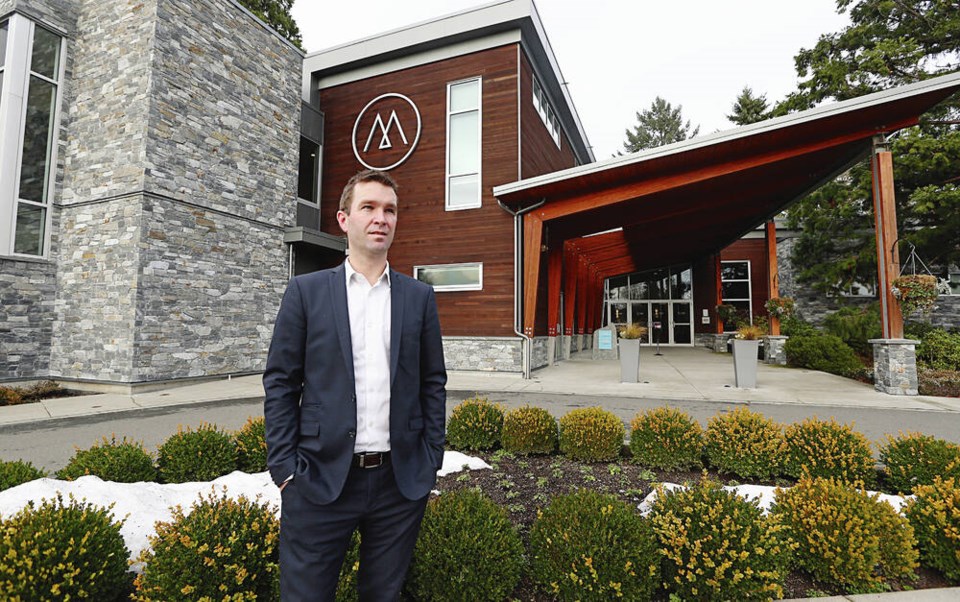Funeral providers in B.C. are calling on the provincial government to boost funding for funerals for low-income people, saying their costs are rising along with the death rate.
The B.C. Funeral Association said the province hasn’t increased funding to its burial program for low-income individuals since 2008, despite a spike in deaths caused by “unprecedented” events such as the pandemic, heat waves and the toxic drug crisis.
Bradd Tuck, executive director of the association and formerly a funeral director at Yates Memorial in Parksville, said the stagnant funding is hurting funeral providers in smaller communities the hardest, but all funeral homes are feeling the pressures.
In some cases, Tuck said, funeral directors are absorbing the extra costs and having to increase overall prices for their services.
“It’s not only inflation, but the unplanned deaths we’re seeing are increasing prices across the board,” said Tuck.
The Provincial Burial Program, administered through the Ministry of Social Development and Poverty Reduction, pays $1,285 to funeral providers for bringing the deceased person to the funeral home, registering the death and filling out paperwork. The cremation or burial is paid at cost.
Another $815 is provided for a small service if a family wants it, but that barely pays for a room or chapel rental, let alone a service with staff, said Tuck.
There is no money for markers or gravestones in cemeteries. The deceased’s remains are laid in a very basic casket or urn purchased at cost and the only record is online and on paper in registries.
Alberta offers more than double what B.C. pays, at $4,421. Tuck said B.C. pays the least amount overall in the country.
Lorraine Fracy, manager of client services at Royal Oak Burial Park in Saanich and government liaison for the industry for more than a decade, said the province’s funeral providers have been ignored by successive governments at budget time, when it comes to increasing funding for the subsidized burial program, despite the number of low-income funerals rising.
Fracy said funeral providers in B.C. have been doing as many as 4,500 low-income funerals a year, compared with about 3,200 in 2017.
Figures provided by the ministry show funding in the fiscal 2020-2021 year for 3,670 funerals, which rose to 3,993 in 2021-2022, during the height of COVID deaths and in the wake of the heat dome.
In 2022-2023, as toxic-drug deaths mounted, 3,880 low-income funeral services were provided.
The average cost of a funeral in British Columbia is $4,789, according to the provincial association. The cost of a cemetery plot can double that figure, depending on the location.
“We believe everyone should have a dignified funeral,” said Fracy. “And frankly, the provincial government is making it hard for those who can’t afford it to do that.”
The province’s social development and poverty reduction ministry said in a statement that it “appreciates the important work done by funeral service providers across B.C. in offering end-of-life services to low-income individuals.”
The ministry said staff have met with the B.C. Funeral Association and are aware of its members’ concerns.
In an interview with Global News in December, Social Development Minister Sheila Malcolmson said the industry has stepped up “to fill the [funding] gaps,” adding: “they’ve got a good case” in the next budget.
Tuck said funeral directors in several ridings have met MLAs and submitted their proposals for an increase to the provincial burial fund for consideration in the next provincial budget, to be delivered Feb. 24.
A government statement said the ministry will continue working with the funeral association, and remains committed to paying the necessary funeral costs of any person who dies in British Columbia “if the deceased person’s estate has no immediate resources to meet these costs.”
The association has suggested the province establish a short-term program to fill the gap, adding an extra $1,400 per contract to funeral providers. But so far, the ministry hasn’t responded.
Tuck noted that funeral providers are facing skyrocketing costs of everything from embalming supplies and caskets to worker wages, property taxes and fuel for transporting the dead.
Trevor McCall said much has changed since his great-grandfather started a funeral parlour in downtown Victoria more than a century ago.
These days, “We’re event planners as much as funeral directors,” said McCall as he prepared for a service last week at McCall Gardens in Saanich.
He said the family-owned funeral company has only two hearses now and doesn’t have the limousines it once used to transport families to grave sites. Embalming specialists are fewer, though preparations of the deceased for viewings before cremation remain a priority.
“The big difference is my dad [and grandparents] were selling caskets, and it’s not so much about that anymore,” said McCall. “It’s about the celebration of life.”
Cremation was used in nearly 90% of all deaths in the province last year.
Tuck said the funeral industry makes use of 10 crematoriums on Vancouver Island, including three in Greater Victoria, but there is pressure from Greater Vancouver funeral providers, who face a shortage of such facilities and often bring the deceased to the Island for cremation.
Funeral providers say the aging demographic will bring more deaths every year, and many will be challenged financially and need assistance from the province for funerals.
Tuck said funeral providers in some smaller communities have to absorb more losses for low-income funerals because they are the only options available for families. “They have long reputations and histories there, so they can’t say no [to providing a low-income funeral].



